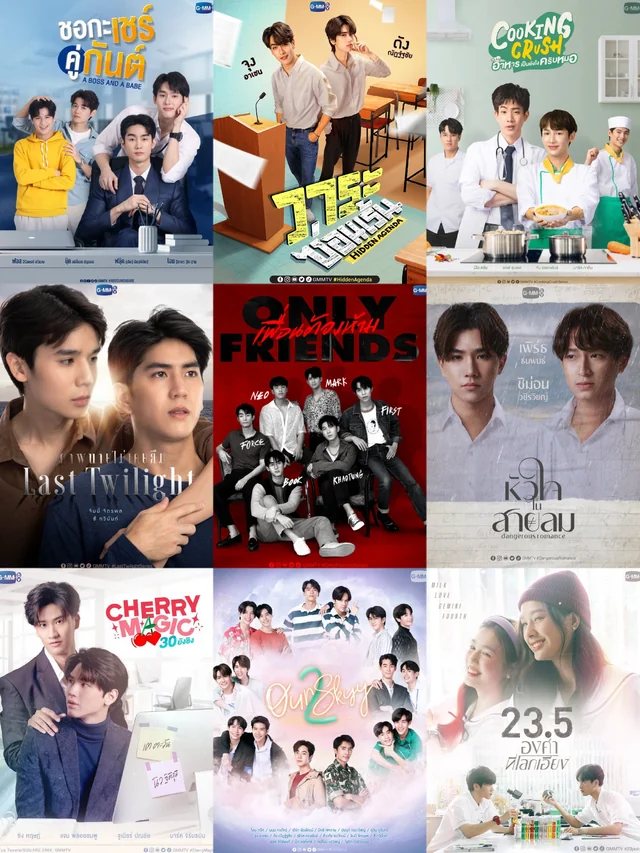The past, present and potential future of Thailand’s “Boys’ Love” series
May 15, 2023
Origins of BL Series: Japan to Thailand
Boys’ Love, commonly refered to as “BL,” is a genre of romantic drama the usually takes form of novels, manga, anime, movies or TV series. The origin of the genre can be traced back to 1970s Japan and was primarily written and consumed by straight women. The women who enjoy BL content were called, “Fujoshi, and the men, “Fudanshi.” Even together, they made for a fairly small viewersip. Despite having a niche audience, the Japanese BL content spread across Southeast Asia to countries like China, South Korea, Philippines, Malaysia and Thailand.
Thailand saw a big growth the fan following for this content. The fans, mostly women, called themselves “Sao Y.” The word “Sao” means sister, and the letter, “Y,” is an abbreviation for BL. Sao Y were generally known to write romantic fanfiction of J-pop or K-pop idols being in gay relationships. This romantic juxtaposing of two men in a fictitious situation is called “shipping.” The LGBTQ+ community took issue with this representation as “Sao Y” would “ship” two straight men (usually with no sign of being gay or attracted to each other) together. Shipper the Series, while not being a BL, is a meta commentary on the “Sao Y,” and discusses all the issues that arises with shipping. Despite these issues, Thailand started to become a small but growing hub for BL fans.
The movie that took BL to a new level in Thailand was “The Love of Siam” (2007), directed by Chookiat Sakveerakul . The movie depicted the growing love between two queer characters. Even though the movie’s cast members don’t identify as gay, through this coming of age story, they showcased the real troubles caused by homophobia. The movie expanded the potential audience of BL stories by releasing in movie theatres. This was a bold move by the filmmakers as homosexuality was a taboo in Thai society. The Love of Siam had a major impact on the Thai BL industry by being one of the first movies to release in theaters at a time when homophobia remained a major barrier..
The creation of the Thai BL Series

Major strides in the early development of Thai BL were made from 2011-2015. In this time, many BL novels, such as “My ride, I love you,” were released and later adapted into TV series. Like The Love of Siam, these series portrayed gay relationships usually in a university setting and sometimes, evensometimes high school settings. The most influential series from this era was called “Hormones the series,” which became a pioneer in the genre. This series was one of the first to mix the existing Thai Series format with BL to create the “Thai BL Series.” The next pivotal series,“Love sick” popularized the genre further in the country. Finally, the genre went global in 2016 with the release of “SOTUS: the series.” The series was readily available on YouTube making it easily accessible without any paywalls – which increased its popularity.
After the success of “SOTUS: the series,” many BL studios tried to copy the show to achieve similar fame. During this period, series like “Until we meet again,” “Love by chance,” “2gether” and “Waterboyy” were created. Multiple BL series studios were in a race to perfect the “Thai BL series” formula by increasing budgets, trying out new storylines, and appealing to a global audience. As a result, these series were viewed as iconic and became instant classics.
“BL Series Formula” and the Pandemic
Before BL’s rise to fame in Thailand, several other Southeast Asian countries experimented with the genre, Hong Kong’s gay movie industry in the 1990s is a prime example. However, none of them have achieved the same level of success as Thailand. Through romantic coming of age stories that often hid the darker aspects of being in a gay relationship, the Thai BL formula was a form of escapism. It managed to capture the hearts of most viewers, regardless of their sexuality.

The pandemic was an essential time period for BL series in Vietnam, Philippines, Taiwan, China, and Japan. The rise of BL in the Philippines is an example of the emergence of competition to the Thai BL industry with series such as “Gameboys,” “Like in the movies” and “Hello stranger.”
Currently, these series continue to be produced regularly. Despite the competition, Thai BL series still have majority of the market and produce most of the new BL series. Thai BL has built a cultural phenomenon similar to South Korean K-pop. The best way to describe this opportunity is “soft power,”which is a way to project influence in a global context without using violence.
The future of the BL Series

More Thai BL series were released in the time period between 2020–2023 than ever before, showcasing the incredible demand for the genre. As a result, the Thai BL industry managed to get $10.7 million of foreign investment for export-oriented purposes. Thai BL is seeing success not only in Thailand but also across the globe. So, it’s emerging as an export for Thailand, which is being supported by foreign investment. The industry is another rising juggernaut from Southeast Asia, as can be seen by its rapid growth. The number of studios and series are rising every year at a faster pace than ever, and the economic potential of the Thai BL industry has made even its adversaries, like the Government and right wing activists, to root for its soft power potential. The viewership of Thai BL series comes from all over the world. And, as more and more countries become less harsh on the LGBTQ+ community, the Thai BL industry will gain more viewership.
Thailand doesn’t have the power to stop other countries from replicating the “BL series” formula. Even though the Philippines and China have not seen successful productions since the pandemic, countries like Taiwan, Japan, and Vietnam are producing series that are at par with Thailand in terms of viewership. More countries could emerge as leaders in this industry as many smaller indie-studios in countries like Cambodia, Myanmar, Malaysia, Singapore, India and other countries may bring new successes to the board. An example of this development is O2 Production from Vietnam who create low budget BLs, and they had their start with a short film: Lost Ring. While the success of the BL industry is yet to show promise, Thailand has been able to rise above all competition. If this pattern continues, the future of the genre seems bright.


Karim Al Hassani • Jul 23, 2023 at 5:16 am
As a gay man with some Chinese and Indian ancestry living in England, I came across BL movies by chance on YouTube about two years ago. Since then I’ve watched movies from virtually every South Asian country including India, Myanmar, and from China, Taiwan, S. Korea, Japan and the Philippines. The quality is variable and the plots often hackneyed and confusing with inexplicable leaps backwards and forwards in time, but one gets used to that and it doesn’t detract too much from enjoying the series. The short movies, often Chinese and Korean, tend to have more drama and less comedy, a feature of many Thai Bl series. The Filipino movies seem to have higher production values, Gameboys being a case in point that was also a hit on Netflix. I think these series have an important role to play in normalising homosexuality in Asia, although they often underplay the hostility young gay people experience in their countries. Together with gay couples’ vlogs such as “Lucas and Kibo,” (mainland China) “BinBIn and RenJie,” (Taiwan) and the advice and discussion forum that also produces short gay themed dramas “Fu Fu Knows” (Taiwan) they contribute to the emerging self-confidence of LGBT youth beyond the liberal western nations that went through this -process in the Seventies. Thai series such as “Cutie Pie” have co-opted the style and sophistication of K-Pop concerts to promote and support their productions.